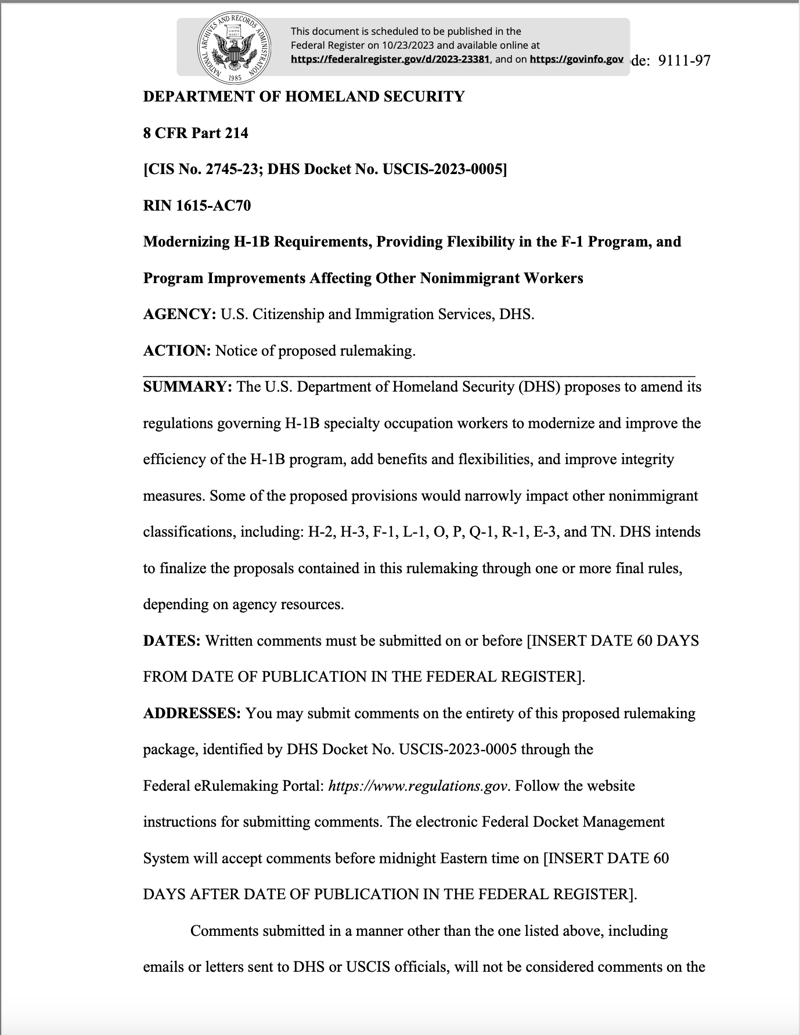|
At a Glance: United States Citizenship and Immigration Services (USCIS) has recently approved a suggested update to enhance the H-1B visa program and introduce more adaptability to the F-1 student visa program. While the full details of this suggested update are still under wraps, it's noteworthy that its approval by the Office of Management and Budget (OMB) is one of the final stages before its public release. |

|
The Department of Homeland Security (DHS) has indicated that this update will: |
Modify rules concerning the bond between employers and employees.
The U.S. Department of Homeland Security (DHS) is proposing to clarify the definition of "employer-employee relationship" in the context of the H-1B program. Currently, the definition of "employer-employee relationship" is based on common law principles and has been a significant barrier to the H-1B program for certain petitioners, including beneficiary-owned petitioners.
To address this issue, DHS proposes removing the reference to an employer-employee relationship requirement from the definition of a U.S. employer. Instead, DHS proposes to codify the existing requirement that the petitioner has a bona fide job offer for the beneficiary to work within the United States. This means that the petitioner must have a genuine job offer for the beneficiary to work in the United States, regardless of whether there is an employer-employee relationship between the petitioner and the beneficiary.
In addition, DHS proposes to replace the requirement that the petitioner "[e]ngages a person to work within the United States" with the requirement that the petitioner have a legal presence and is amenable to service of process in the United States. This means that the petitioner must have a legal presence in the United States and be subject to service of process in the United States.
These proposed changes aim to promote clarity and transparency in the regulations, reduce administrative barriers, and make it easier for certain petitioners to participate in the H-1B program.
Set forth fresh criteria for on-site inspections.
The U.S. Department of Homeland Security (DHS) proposes to set forth fresh criteria for on-site inspections as part of the H-1B program. The proposed regulations would make clear that inspections may include but are not limited to, an on-site visit of the petitioning organization's facilities, interviews with its officials, a review of its records related to compliance with immigration laws and regulations, and interviews with any other individuals or review of any other records that DHS deems relevant.
The proposed provisions would also clarify that an inspection may occur at the petitioning organization's headquarters, satellite locations, or where the beneficiary works or will work, including third-party worksites, as applicable. This means that DHS would have the authority to inspect any location where the labor will be performed for the purpose of determining compliance with applicable H-1B requirements.
The proposed regulation would also state the consequences if USCIS cannot verify facts related to an H-1B petition due to the failure or refusal of the petitioner or a third-party worksite to cooperate with a site visit. These failures or refusals may be grounds for denial or revocation of any H-1B petition related to locations that are subject to inspection, including any third-party worksites.
The proposed regulations aim to strengthen the integrity of the H-1B program by ensuring that petitioners comply with applicable requirements and that beneficiaries are employed in accordance with the terms of their H-1B status. By setting forth fresh criteria for on-site inspections, DHS hopes to deter fraud and abuse in the H-1B program and promote compliance with immigration laws and regulations.
Offer more leeway regarding the commencement dates for employees under specific conditions.
The U.S. Department of Homeland Security (DHS) proposes offering more leeway regarding the commencement dates for employees under specific conditions as part of the H-1B program. Specifically, DHS is proposing to clarify the requirements regarding the requested employment start date on H-1B cap-subject petitions to permit filing with requested start dates that are after October 1 of the relevant fiscal year, consistent with current USCIS policy.
Under current regulations, H-1B cap-subject petitions can only be filed up to six months before the requested employment start date, typically October 1 of the fiscal year. This has created challenges for employers who may not be able to predict their hiring needs that far in advance or who may need to hire employees outside of the typical hiring cycle.
To address this issue, DHS is proposing to eliminate all the text currently at 8 CFR 214.2(h)(8)(iii)(A)(4), which relates to a limitation on the requested start date because the current regulatory language is ambiguous. Instead, DHS proposes to clarify that H-1B cap-subject petitions may be filed with requested start dates that are after October 1 of the relevant fiscal year, as long as the requested start date is within the fiscal year for which the H-1B cap is being sought.
In addition, DHS is proposing to provide flexibilities, such as automatically extending the duration of F-1 status and any employment authorization granted under 8 CFR 274a.12(c)(3)(i)(B) or (C), until April 1 of the relevant fiscal year, rather than October 1 of the same fiscal year, to avoid disruptions in lawful status and employment authorization for F-1 students changing their status to H-1B.
Overall, these proposed changes aim to provide more leeway for employers and employees under specific conditions while still maintaining the integrity of the H-1B program. By allowing for more flexibility in the requested employment start date, DHS hopes to make it easier for employers to hire the workers they need while also ensuring that the H-1B program is being used for its intended purpose.
Tackle issues related to the "cap-gap."
The U.S. Department of Homeland Security (DHS) proposes tackling issues related to the "cap-gap" as part of the H-1B program. The cap-gap refers to the period between the end of a student's F-1 status and the beginning of their H-1B status, which typically begins on October 1 of the fiscal year.
Currently, F-1 students who are the beneficiaries of timely filed H-1B petitions requesting a change of status to H-1B on October 1 are eligible for a cap-gap extension of their F-1 status and any employment authorization until September 30 of the fiscal year. However, there are several issues related to the cap-gap that DHS is proposing to address.
First, DHS proposes clarifying that the cap-gap extension is only available to F-1 students with a valid F-1 status when the H-1B petition is filed. This means that F-1 students who have violated their status or who have engaged in unauthorized employment would not be eligible for the cap-gap extension.
Second, DHS is proposing to provide a gap extension to temporarily extend the period of authorized stay and work authorization of certain F-1 students caught in a gap between the end of their program and the start date on their later-in-time approved, cap-subject H-1B petition. This would allow F-1 students who are not eligible for the cap-gap extension to remain in the United States and continue working until the start date of their H-1B status.
Finally, DHS is proposing to clarify that petitions filed solely to obtain cap-gap protections would run the risk of being denied before October 1. This would result in no additional benefit from the expanded timeframe. Any risk of fraud is already inherent in providing cap-gap relief itself, and DHS is unaware of any additional risk presented by extending the cap-gap period.
These proposed changes aim to address issues related to the cap gap and provide more clarity and flexibility for F-1 students and H-1B petitioners. By ensuring that the cap-gap extension is only available to eligible F-1 students and providing a gap extension for those who are not eligible, DHS hopes to promote compliance with immigration laws and regulations and reduce disruptions in lawful status and employment authorization for F-1 students and H-1B beneficiaries.
Strengthen the registration process to reduce misuse and fraud.
The U.S. Department of Homeland Security (DHS) is proposing to amplify the robustness of the registration procedure to minimize potential misuse and deception as part of the H-1B program. The proposed regulations aim to strengthen the integrity of the H-1B program by ensuring that only eligible and qualified petitioners and beneficiaries are selected for H-1B visas.
To achieve this goal, DHS proposes several registration procedure changes. First, DHS proposes requiring petitioners to electronically register with USCIS during a designated registration period, which would be at least 30 days before the start of the H-1B filing season. This would allow USCIS to more efficiently manage the intake and processing of H-1B petitions and reduce the burden on both petitioners and USCIS.
Second, DHS proposes modifying the random selection process to increase the likelihood of selecting beneficiaries with a master's or higher degree from a U.S. institution of higher education. Specifically, DHS proposes first to select 65,000 beneficiaries from the pool of all registrations and then select an additional 20,000 beneficiaries, including a master's or higher degree from a U.S. institution of higher education. This would increase the chances of selecting beneficiaries with advanced degrees and help to meet the needs of U.S. employers who require highly skilled workers.
Third, DHS is proposing to require petitioners to attest to the legitimacy of the job offer and to certify that they have not worked with, or agreed to work with, another petitioner, agent, or individual to submit a registration to unfairly increase the chances of selection for the beneficiary or beneficiaries in the submission. This would help to prevent potential abuse and ensure that the registration system is being used for its intended purpose.
Finally, DHS is proposing to increase the robustness of the registration procedure by conducting targeted site visits and other investigations to verify the information provided in the registration and to ensure compliance with applicable H-1B requirements. This would help to deter fraud and abuse in the H-1B program and promote compliance with immigration laws and regulations.
Overall, these proposed changes aim to amplify the robustness of the registration procedure to minimize potential misuse and deception in the H-1B program. By requiring electronic registration, modifying the random selection process, requiring attestations and certifications, and conducting targeted site visits and investigations, DHS hopes to ensure that only eligible and qualified petitioners and beneficiaries are selected for H-1B visas and that the H-1B program is being used for its best practice.
Clarify when to refile or amend petitions due to major changes.
Regarding the necessity for refiling or amending petitions when significant changes occur, the U.S. Department of Homeland Security (DHS) is proposing to clarify when an amended or new petition must be filed due to a change in an H-1B worker’s place of employment to be consistent with current policy guidance. Additionally, DHS proposes to codify and clarify its deference policy to state that if there has been no material change in the underlying facts, adjudicators generally should defer to a prior determination involving the same parties and underlying facts.
Currently, 8 CFR 214.2(h)(11)(i)(A) requires a petitioner to “immediately notify” USCIS of a change in the terms and conditions of employment of a beneficiary which may affect eligibility for H-1B status. However, USCIS seeks to clarify when an amended or new petition must be filed or when a petitioner need not file an amended petition. To find relevant requirements, H-1B petitioners and USCIS officers currently must look to various sources, including USCIS policy guidance, DOL regulations, and DOL guidance. DHS seeks to make its regulations relating to amended or new H-1B petitions more comprehensive and useful by incorporating relevant requirements into proposed 8 CFR 214.2(h)(2)(i)(E)(2).
In summary, the proposed changes aim to clarify when an amended or new petition must be filed due to a change in an H-1B worker’s place of employment and to codify and clarify the deference policy. By doing so, DHS hopes to provide more clarity and consistency for H-1B petitioners and USCIS officers and promote compliance with immigration laws and regulations.
Insights by CPTdog
1. Redefining Employer-Employee Relationship:
-
Insight: The U.S. Department of Homeland Security (DHS) is streamlining the definition of the "employer-employee relationship" to make the H-1B visa program more accessible, especially for beneficiary-owned petitioners.
-
Prediction: This will likely increase the number of H-1B applications as the process becomes clearer and more inclusive.
2. Enhanced On-site Inspections:
-
Insight: DHS is intensifying the criteria for on-site inspections to ensure compliance with H-1B requirements.
-
Prediction: Companies must be more vigilant and transparent in their operations as the scope and consequences of inspections become more stringent.
3. Flexible Commencement Dates:
-
Insight: DHS offers flexibility in the employment start dates for H-1B cap-subject petitions.
-
Prediction: This will likely ease the hiring process for employers, allowing them to better align with their business needs and cycles.
4. Addressing the "Cap-Gap":
-
Insight: DHS is taking measures to bridge the gap between the end of F-1 status and the beginning of H-1B status.
-
Prediction: This will likely reduce disruptions in employment and status for F-1 students transitioning to H-1B, ensuring a smoother transition for employers and employees.
5. Strengthening the Registration Process:
-
Insight: DHS is enhancing the H-1B registration process to ensure it's robust and free from misuse and fraud.
-
Prediction: The H-1B program will likely see a reduction in fraudulent activities, ensuring that only genuine and qualified candidates are selected.
6. Clarification on Refiling or Amending Petitions:
-
Insight: DHS provides clearer guidelines on when to refile or amend H-1B petitions due to significant changes.
-
Prediction: This will likely reduce the number of errors and rejections in H-1B applications, streamlining the process for both petitioners and USCIS officers.
Overall Forecast: The proposed changes by the DHS aim to make the H-1B visa program more transparent, efficient, and inclusive. While this will benefit genuine applicants and employers, it also means stricter compliance checks. Companies and applicants should stay updated with these changes to navigate the H-1B process successfully.


